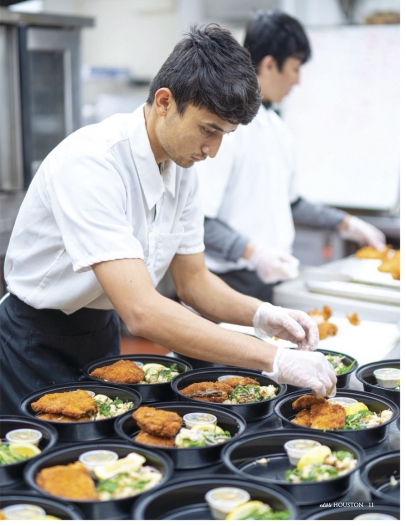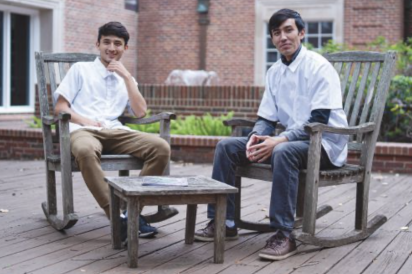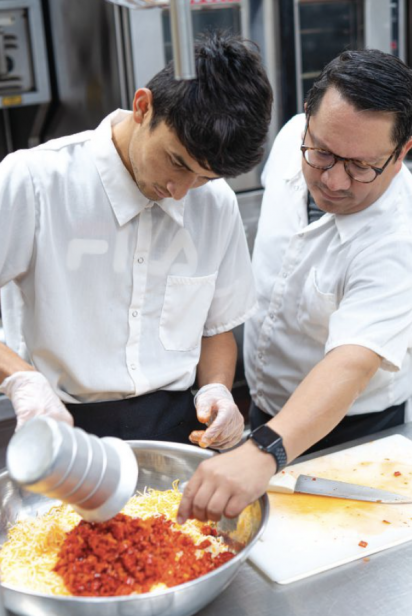Beyond Knife Skills
An experience-based culinary program uses the kitchen to mentor young adults.
On a windy day in April, Hassan and Mahdi, two brothers who fled Afghanistan when the Taliban returned to power, were serving firnee with haft mewa, a favorite Afghan dessert, to the roaming patrons of Houston’s Chef Fest. It’s a rich custard flavored with rosewater and vanilla and topped with dried fruits, nuts and almond cookies.
Many, including me, were returning for seconds. “They were coming back,” says Hassan. “Some were coming because their friend told them it was a good dessert.” That’s quite an achievement at a farm-to-table event that featured some of Houston’s most talented chefs, including Top Chef contestant Evelyn Garcia.
The two brothers would someday like to open their own restaurant — a dream inspired by their father who owned three eateries in Kuwait, spending half the year there and half in Afghanistan. The PX Project is helping them get started.
Named after restaurant slang for VIPs — extraordinary person or PX for short — the eighteen-week, culinary-based program works with marginalized people between 18 and 25 to develop life and professional skills. In addition, participants are treated as professional partners and are paid, which is important because many are supporting their families.
Adam Garcia, the executive chef and director of operations for PX Project, who helmed kitchens at some of Houston’s best restaurants (Coltivare, Rosie Cannonball) defines it as a workforce development program Meredith Davis, the nonprofit’s founder and executive director, adds, “We are not a culinary school, but there is obviously a huge culinary piece. What we are doing is giving them general employability skills.”
When Hassan and Madhi attended Chef Fest, they were about a third of the way through the program. It would be one of several such experiences. According to Garcia, the fellows in each cohort will participate in several events and field trips, from cooking for dinner parties and events, which are often tied to fundraising, to visiting grocery stores and Plant It Forward Farms, where one alum is now a delivery driver.
For Hassan and Madhi, the journey to PX Project’s commercial kitchen was difficult. When their family of seven — Hassan, Madhi, their sister, two brothers, mother and father — heard that the Taliban was entering Kabul, they decided to leave. “If you have a family member that works for the government or embassy, like my sister did at the time, the Taliban will take members of your family hostage,” says Hassan.
They knew they had to act fast. But their father wanted to wait until after a religious ceremony to feed the poor. They left the next day. Each brother carried a backpack stuffed with one change of clothes per family member. Hassan also brought a hard drive full of family photos.
They arrived at the Kabul airport at 7 p.m. “There were so many people and I was afraid my family would get trampled,” says Hassan. They got on a plane at 3:30 a.m., “Everyone was sitting, squished together, trying not to hurt each other when the plane hit turbulence,” says Hassan. They expected to land in Qatar, but it had too many refugees. Instead, they deplaned in Kuwait, where they spent several stressful, sleepless days.
Once they arrived in Houston, Madhi told Erinn Murphy, who was helping sponsor Afghan refugees, that he was “searching for culinary schools.” Murphy took Madhi to a PX Project open house. “When I visited,” says Madhi, “I told Adam and Meredith that my bigger brother and I are interested.”
The brothers aren’t the first refugees in the program. To date, nine out of the 12 fellows have been immigrants or refugees. Beyond Afghanistan, they have come from Tanzania, Kenya, Democratic Republic of Congo, Ethiopia and Eritrea. This isn’t surprising since the neighborhoods the project focuses on, Gulfton and Sharpstown, are two of Houston’s most diverse.
When Davis and Garcia were first ready to launch the PX program back in 2020, COVID-19 hit. They postponed opening the kitchen to fellows. As schools started shifting to online classes, they realized that some students would be missing school lunch, often the only meal they ate. So, they prepared over 9,000 meals for children in Gulfton and Sharpstown. Distributing the meals also gave the pair an opportunity to spread the word about PX Project. Though they prefer students to graduate first, they gathered information from those who expressed interest in attending when they turned 18.
When fellows start the program, Garcia teaches them kitchen basics and certifies them in ServSafe, a food safety program. Eventually, they learn about sourcing, costing, creating recipes, zero waste and more. “We are learning how to work in the kitchen,” says Madhi. “How to work with a knife, everything that is necessary in the kitchen. Also, we are learning how we manage our own restaurant.”
Garcia himself worked his way up, from sorting through trash to find discarded silverware to being chef de cuisine/partner at one of Houston’s best restaurants. However, after more than 20 years working in restaurants, he felt burnt out. Yet, restaurants were important to him. “I found a home there at an early age,” says Garcia. As he was considering his options, he realized, “I always liked working with that young, green cook and being a mentor for them.”
For Garcia, the PX Project is about teaching more than knife skills. “We’ll have a welcome breakfast every day,” says Garcia. “We cook for each other, we tell stories about growing up, talk about what we ate and our favorite foods, which starts to break down barriers.”
Hassan’s favorite dish from his homeland is Kabuli palaw, a classic rice dish made with beef, carrots, onions, garam masala, ginger, raisins and cilantro. Madhi’s favorite is mantu, dumplings filled with vegetables, primarily leeks, and served with a yogurt dipping sauce. Madhi also loves chakni, an Afghan chutney made with lots of parsley, cilantro and vinegar (see recipe on page x).
These preferences help shape the direction of the fellow’s program and what they cook in the kitchen. For Madhi and Hassan, that means their family is involved. Their father didn’t have recipes and their mother did most of the cooking at home, which both brothers enthusiastically agreed was good. Garcia has been working with them to develop scalable recipes for events and for the biweekly lunches they prepare and sell to the employees of the facility where the kitchen is located. “What’s really cool is they are cooking at home together now, recording it and bringing it to me,” says Garcia.
For one recent lunch — they take preorders the day before they cook and package about 75 lunches — they served Kabuli palaw. To develop the recipe, the brothers brought in a version made by their mother, then FaceTimed her while they were cooking. “They were smiling and laughing,” says Garcia. It was a hit, as was another dish their mother cooks regularly, bolani, a fried flatbread stuffed with beef, potatoes, green onions, cilantro and lentils that is served with chakni.
But they don’t just cook. Once the lunches are ready, they practice interacting with people by checking names, ringing up customers and presenting the food. “In this program, you first learn about cooking,” says Hassan. “Second, how to know ourselves. Third, how to communicate with people.”
Alexandra Smith, the director of programming and learning, is key to the last two. She tailors daily learning experiences covering topics such as financial literacy, self-care and resume writing to the needs of the fellows. Hassan and Madhi, who already speak several languages, want to learn Spanish. Smith is searching for suitable classes. Each fellow also participates in paid externships in fields that interest them, which have ranged from working at Recipe for Success’s Hope Farms to shadowing nurses.
When fellows graduate, the program ensures they have job interviews and an exit package to cover the cost of things such as transportation to interviews and appropriate work attire. “We don’t want them to graduate and then just wave from the window,” says Davis. “We want to make sure that they are ready for the next thing.”
For Madhi and Hassan, the next thing may be selling their food at a farmers market. Their mother makes delicious, beautifully decorated Afghan naan. They wondered if they could sell it. So, one Saturday, Garcia took them to the Urban Harvest Farmers Market, where they toured the bread vendors. Madhi realized, “We can start here. It’s good for people who are new here.”
Bread is universal. Almost every culture has a version. “I’ve learned tortillas for me is naan for Hassan and Madhi and is fufu for people from Congo,” says Garcia. “My father used tortillas the way their dad uses naan. You don’t use a fork. You’re taught there is more flavor if you use your hands.”
Note: Madhi and Hassan’s surname has been withheld to protect their safety.
To learn more about PX Project, how to donate, schedule fellows to cook for an event and about its forthcoming cafe and bigger kitchen, visit www.pxproject.org.
PX Project alum, Arsel Kisanga, along with his brother Mustapha Qudus, established Qing Creative Agency in 2019. The brothers oversee the company, which innovatively tailors content creation, website development, and social media management to its clients needs. To learn more visit: QingAgency.com







